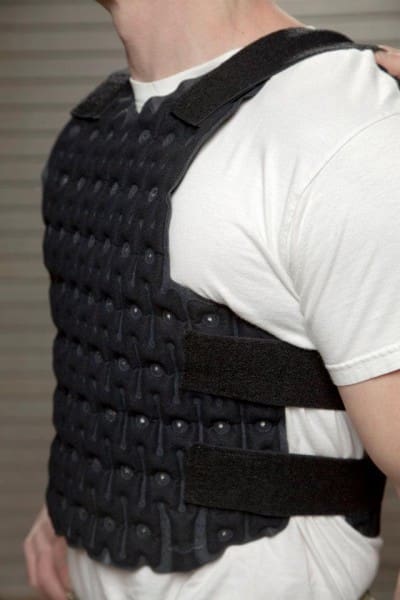Our friends at BOLO Report published an article on the CORTAC CTAV. The Advanced Impact Resistance Technology creates a “behind armor thermoregulated microclimate [that] promotes convection while vented panels improve heat dissipation.”
Basically, you attach it to your existing armor to offer thermo regulation and mitigate blunt force trauma.
Tags: BOLO Report, CORTAC



Thought it would be worthwhile to check out but not for $250.
Kango– the $249 is MSRP. We have different price levels for MIL/LE. GSA is $199. And we’d be willing to let you ‘test-drive’ it to prove it’s value! Just let us know…
Jeremy
jharrell@cortac.com
For the blunt trauma thing, the Danish Army has since mid 90’s been issuing a shock absorber pad that goes behind the plates in the plate pocket. Basically it’s a thick sleepmat like material, like 2 cm thick.
Keld, very true. If you’re into this stuff, you may find The Journal of Trauma, 2009 article “Trauma Attenuating Backing Improves Protection Against Behind Armor Blunt Trauma” an interesting read.
“The animals [porcine] protected by the TAB [Trauma Attenuating Backing] did
not display hemoptysis and had a significantly smaller pulmonary
contusion than animals in the control group. The
respiratory and circulatory changes in animals protected by
TAB were not life threatening in any case. Therefore, we
conclude that low-density TAB could be applied to minimize
the trauma by high energy impacts.”
Keld, true. If you’re into this area of study or interest, you may find The Journal of Trauma, 2009 article “Trauma Attenuating Backing Improves Protection Against Behind Armor Blunt Trauma” an interesting read.
“The animals protected by the TAB [Trauma Attenuating Backing] did
not display hemoptysis and had a significantly smaller pulmonary
contusion than animals in the control group. The
respiratory and circulatory changes in animals protected by
TAB were not life threatening in any case. Therefore, we
conclude that low-density TAB could be applied to minimize
the trauma by high energy impacts.”